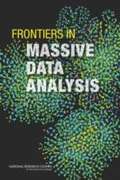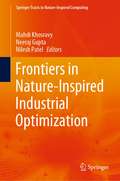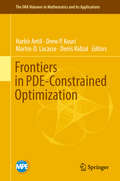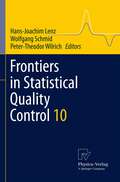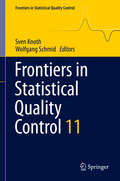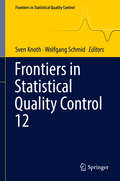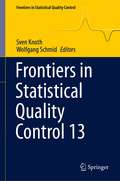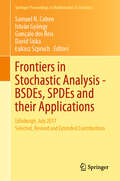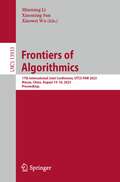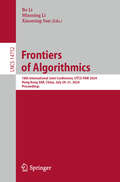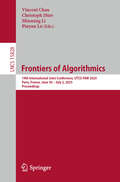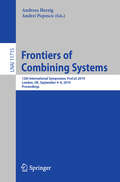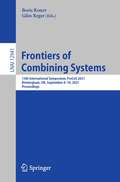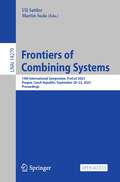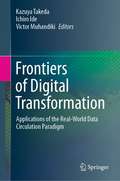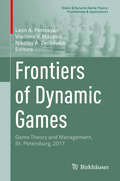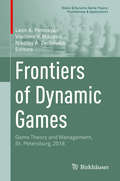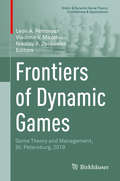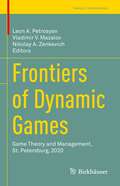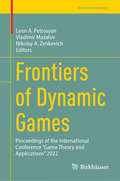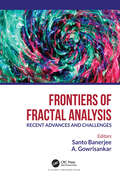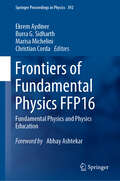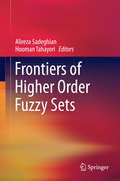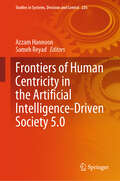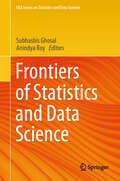- Table View
- List View
Frontiers in Massive Data Analysis
by National Research Council Division on Engineering and Physical Sciences Board on Mathematical Sciences And Their Applications Committee on Applied and Theoretical Statistics Committee on the Analysis of Massive DataData mining of massive data sets is transforming the way we think about crisis response, marketing, entertainment, cybersecurity and national intelligence. Collections of documents, images, videos, and networks are being thought of not merely as bit strings to be stored, indexed, and retrieved, but as potential sources of discovery and knowledge, requiring sophisticated analysis techniques that go far beyond classical indexing and keyword counting, aiming to find relational and semantic interpretations of the phenomena underlying the data. Frontiers in Massive Data Analysis examines the frontier of analyzing massive amounts of data, whether in a static database or streaming through a system. Data at that scale--terabytes and petabytes--is increasingly common in science (e.g., particle physics, remote sensing, genomics), Internet commerce, business analytics, national security, communications, and elsewhere. The tools that work to infer knowledge from data at smaller scales do not necessarily work, or work well, at such massive scale. New tools, skills, and approaches are necessary, and this report identifies many of them, plus promising research directions to explore. Frontiers in Massive Data Analysis discusses pitfalls in trying to infer knowledge from massive data, and it characterizes seven major classes of computation that are common in the analysis of massive data. Overall, this report illustrates the cross-disciplinary knowledge--from computer science, statistics, machine learning, and application disciplines--that must be brought to bear to make useful inferences from massive data.
Frontiers in Nature-Inspired Industrial Optimization (Springer Tracts in Nature-Inspired Computing)
by Neeraj Gupta Mahdi Khosravy Nilesh PatelThe book provides a collection of recent applications of nature inspired optimization in industrial fields. Different optimization techniques have been deployed, and different problems have been effectively analyzed. The valuable contributions from researchers focus on three ultimate goals (i) improving the accuracy of these techniques, (ii) achieving higher speed and lower computational complexity, and (iii) working on their proposed applications. The book is helpful for active researchers and practitioners in the field.
Frontiers in PDE-Constrained Optimization (The IMA Volumes in Mathematics and its Applications #163)
by Harbir Antil Drew P. Kouri Martin-D. Lacasse Denis RidzalThis volume provides a broad and uniform introduction of PDE-constrained optimization as well as to document a number of interesting and challenging applications. Many science and engineering applications necessitate the solution of optimization problems constrained by physical laws that are described by systems of partial differential equations (PDEs). As a result, PDE-constrained optimization problems arise in a variety of disciplines including geophysics, earth and climate science, material science, chemical and mechanical engineering, medical imaging and physics. This volume is divided into two parts. The first part provides a comprehensive treatment of PDE-constrained optimization including discussions of problems constrained by PDEs with uncertain inputs and problems constrained by variational inequalities. Special emphasis is placed on algorithm development and numerical computation. In addition, a comprehensive treatment of inverse problems arising in the oil and gas industry is provided. The second part of this volume focuses on the application of PDE-constrained optimization, including problems in optimal control, optimal design, and inverse problems, among other topics.
Frontiers in Statistical Quality Control 10
by Hans-Joachim Lenz Wolfgang Schmid Peter-Theodor WilrichThe 10th International Workshop on Intelligent Statistical Quality Control took place in Seattle, USA, Aug 18-20, 2010. It was hosted by Professor C. M. Mastrangelo, Department of Industrial and Systems Engineering, University of Washington, Seattle. The workshop was jointly organized by Professors H. J. Lenz, C. M. Mastrangelo, W. Schmid and P.T. Wilrich. The twenty-seven papers in this volume were carefully selected by the scientific program committee, reviewed by its members, revised by the authors and, finally, adapted for this volume by the editors. The book is divided into two parts: Part I "On-line Control" covers fields like control charting, monitoring and surveillance as well as acceptance sampling. Part II "Off-line Control" is devoted to experimental design, process capability analysis and data quality. The purpose of the book is on the one hand to provide insights into important new developments in the area of statistical quality control - especially surveillance and monitoring - and on the other hand to critically discuss methods used in on-line and off-line statistical quality control.
Frontiers in Statistical Quality Control 11
by Sven Knoth Wolfgang SchmidThe main focus of this edited volume is on three major areas of statistical quality control: statistical process control (SPC), acceptance sampling and design of experiments. The majority of the papers deal with statistical process control, while acceptance sampling and design of experiments are also treated to a lesser extent. The book is organized into four thematic parts, with Part I addressing statistical process control. Part II is devoted to acceptance sampling. Part III covers the design of experiments, while Part IV discusses related fields. The twenty-three papers in this volume stem from The 11th International Workshop on Intelligent Statistical Quality Control, which was held in Sydney, Australia from August 20 to August 23, 2013. The event was hosted by Professor Ross Sparks, CSIRO Mathematics, Informatics and Statistics, North Ryde, Australia and was jointly organized by Professors S. Knoth, W. Schmid and Ross Sparks. The papers presented here were carefully selected and reviewed by the scientific program committee, before being revised and adapted for this volume.
Frontiers in Statistical Quality Control 12 (Frontiers in Statistical Quality Control)
by Sven Knoth Wolfgang SchmidThis book provides insights into important new developments in the area of statistical quality control and critically discusses methods used in on-line and off-line statistical quality control.The book is divided into three parts: Part I covers statistical process control, Part II deals with design of experiments, while Part III focuses on fields such as reliability theory and data quality. The 12th International Workshop on Intelligent Statistical Quality Control (Hamburg, Germany, August 16 – 19, 2016) was jointly organized by Professors Sven Knoth and Wolfgang Schmid. The contributions presented in this volume were carefully selected and reviewed by the conference’s scientific program committee. Taken together, they bridge the gap between theory and practice, making the book of interest to both practitioners and researchers in the field of quality control.
Frontiers in Statistical Quality Control 13 (Frontiers in Statistical Quality Control)
by Sven Knoth Wolfgang SchmidThis contributed book focuses on major aspects of statistical quality control, shares insights into important new developments in the field, and adapts established statistical quality control methods for use in e.g. big data, network analysis and medical applications. The content is divided into two parts, the first of which mainly addresses statistical process control, also known as statistical process monitoring. In turn, the second part explores selected topics in statistical quality control, including measurement uncertainty analysis and data quality.The peer-reviewed contributions gathered here were originally presented at the 13th International Workshop on Intelligent Statistical Quality Control, ISQC 2019, held in Hong Kong on August 12-14, 2019. Taken together, they bridge the gap between theory and practice, making the book of interest to both practitioners and researchers in the field of statistical quality control.
Frontiers in Stochastic Analysis–BSDEs, SPDEs and their Applications: Edinburgh, July 2017 Selected, Revised and Extended Contributions (Springer Proceedings in Mathematics & Statistics #289)
by Samuel N. Cohen István Gyöngy Gonҫalo Dos Reis David Siska Łukasz SzpruchThis collection of selected, revised and extended contributions resulted from a Workshop on BSDEs, SPDEs and their Applications that took place in Edinburgh, Scotland, July 2017 and included the 8th World Symposium on BSDEs. The volume addresses recent advances involving backward stochastic differential equations (BSDEs) and stochastic partial differential equations (SPDEs). These equations are of fundamental importance in modelling of biological, physical and economic systems, and underpin many problems in control of random systems, mathematical finance, stochastic filtering and data assimilation. The papers in this volume seek to understand these equations, and to use them to build our understanding in other areas of mathematics.This volume will be of interest to those working at the forefront of modern probability theory, both established researchers and graduate students.
Frontiers of Algorithmics: 17th International Joint Conference, IJTCS-FAW 2023 Macau, China, August 14–18, 2023 Proceedings (Lecture Notes in Computer Science #13933)
by Minming Li Xiaoming Sun Xiaowei WuThis book constitutes the refereed proceedings of the 17th International Joint Conference on Theoretical Computer Science-Frontier of Algorithmic Wisdom (IJTCS-FAW 2023), consisting of the 17th International Conference on Frontier of Algorithmic Wisdom (FAW) and the 4th International Joint Conference on Theoretical Computer Science (IJTCS), held in Macau, China, during August 14–18, 2023.FAW started as the Frontiers of Algorithmic Workshop in 2007 at Lanzhou, China, and was held annually from 2007 to 2021 and published archival proceedings. IJTCS, the International joint theoretical Computer Science Conference, started in 2020, aimed to bring in presentations covering active topics in selected tracks in theoretical computer science. To accommodate the diversified new research directions in theoretical computer science, FAW and IJTCS joined their forces together to organize an event for information exchange of new findings and work of enduring value in the field. The 21 full papers included in this book were carefully reviewed and selected from 34 submissions. They were organized in topical sections as follows: algorithmic game theory; algorithms and data structures; combinatorial optimization; and computational economics.
Frontiers of Algorithmics: 18th International Joint Conference, IJTCS-FAW 2024, Hong Kong SAR, China, July 29-31, 2024, Proceedings (Lecture Notes in Computer Science #14752)
by Minming Li Bo Li Xiaoming SunThis book constitutes the refereed proceedings of the 18th International Joint Conference on Theoretical Computer Science-Frontier of Algorithmic Wisdom (IJTCS-FAW 2024), consisting of the 18th International Conference on Frontier of Algorithmic Wisdom (FAW) and the 5th International Joint Conference on Theoretical Computer Science (IJTCS), held in Hong Kong, SAR, China, during July 29-31, 2024. FAW started as the Frontiers of Algorithmic Workshop in 2007 at Lanzhou, China, and was held annually from 2007 to 2021 and published archival proceedings. IJTCS, the International joint theoretical Computer Science Conference, started in 2020, aimed to bring in presentations covering active topics in selected tracks in theoretical computer science. To accommodate the diversified new research directions in theoretical computer science, FAW and IJTCS joined their forces together to organize an event for information exchange of new findings and work of enduring value in the field. The 20 full papers and 3 short papers included in this book were carefully reviewed and selected from 43 submissions. They focused tracks on algorithms, blockchain theory, computational economics and algorithmic game theory.
Frontiers of Algorithmics: 19th International Joint Conference, IJTCS-FAW 2025, Paris, France, June 30 – July 2, 2025, Proceedings (Lecture Notes in Computer Science #15828)
by Minming Li Pinyan Lu Christoph Dürr Vincent ChauThis book LNCS15828 constitutes the refereed proceedings of the 19th International Joint Conference on Theoretical Computer Science-Frontier of Algorithmic Wisdom (IJTCS-FAW 2025), consisting of the 19th International Conference on Frontier of Algorithmic Wisdom (FAW) and the 6th International Joint Conference on Theoretical Computer Science (IJTCS), held in Paris, France, during June 30–July 2, 2025. The 28 full papers and 2 short papers were carefully reviewed and selected from 63 submissions. The proceedings focuses on Frontiers of Algorithmic Wisdom; Block-chain, Distributed Computing, Multi-Agents; Game Theory, Algorithmic Game Theory, Machine Learning, Electronic Commerce.
Frontiers of Combining Systems: 12th International Symposium, FroCoS 2019, London, UK, September 4-6, 2019, Proceedings (Lecture Notes in Computer Science #11715)
by Andreas Herzig Andrei PopescuThis book constitutes the proceedings of the 12th International Symposium on Frontiers of Combining Systems, FroCoS 2019, held in London, UK, in September 2019, colocated with the 28th International Conference on Automated Reasoning with Analytic Tableaux and Related Methods, TABLEAUX 2019. The 20 papers presented were carefully reviewed and selected from 30 submissions. They present research on the development of techniques and methods for the combination and integration of formal systems, their modularization and analysis. The papers are organized in the following topical sections: automated theorem proving and model building, combinations of systems, constraint solving, description logics, interactive theorem proving, modal and epistemic logics, and rewriting and unification.
Frontiers of Combining Systems: 13th International Symposium, FroCoS 2021, Birmingham, UK, September 8–10, 2021, Proceedings (Lecture Notes in Computer Science #12941)
by Giles Reger Boris KonevThis book constitutes the refereed proceedings of the 13th International Symposium on Frontiers of Combining Systems, FroCoS 2021, held in Birmingham, UK, in September 2021.
Frontiers of Combining Systems: 14th International Symposium, FroCoS 2023, Prague, Czech Republic, September 20–22, 2023, Proceedings (Lecture Notes in Computer Science #14279)
by Uli Sattler Martin SudaThis book constitutes the refereed proceedings of the 14th International Symposium on Frontiers of Combining Systems, FroCoS 2023, held in Prague, Czech Republic, in September 2023. The symposium was co-located with the 32nd International Conference on Automated Reasoning with Analytic Tableaux and Related Methods, TABLEAUX 2023.The 14 papers presented were thorouhgly reviewed and selected from the 22 high-quality paper submissions. They are grouped in the volume according to the following topic classification: analysis of programs and equations; unification; decidable fragments; frameworks; higher-order theorem proving.This is an open access book.
Frontiers of Digital Transformation: Applications of the Real-World Data Circulation Paradigm
by Kazuya Takeda Ichiro Ide Victor MuhandikiProposing the concept of real-world data circulation (RWDC), this book presents various practical and industry-related studies in human, mechanical, and social data domains. RWDC is a new field of study, established by the information technology (IT) community.In the real world, the speed of data transmission between computers surpassed that of human communications long ago and has since expanded exponentially. As a result, the origin of the majority of data has become non-human, mechanical, or natural sources; in fact, humans are merely the source of a small part of the current data explosion. Such expanding data transmission does not simply consist of single source–destination pairs, but actually circulates over a complex network connecting numerous sources and destinations. Such circulation is an important aspect of the underlying systems. Based on this concept, in order to tame and control the massive amount of data originating from non-human sources, the authors have been considering the insertion of acquisition, analysis, and implementation processes in the flow of data circulation. This book introduces the outcome of the RWDC degree program organized at Nagoya University, Japan, collecting contributions from graduate students enrolled in the program from various research fields targeting diverse applications. Through examples of RWDC, the resulting creation of social value is illustrated. This book will be useful not only for those working on the topics discussed, but also to anyone who is interested in RWDC, digital transformation, and Industry 4.0.
Frontiers of Dynamic Games: Game Theory and Management, St. Petersburg, 2017 (Static & Dynamic Game Theory: Foundations & Applications)
by Leon A. Petrosyan Vladimir V. Mazalov Nikolay A. ZenkevichThis volume collects contributions from the talks given at the Game Theory and Management Conference held in St. Petersburg, Russia, in June 2017. It covers a wide spectrum of topics, among which are: game theory and management applications in fields such as: strategic management, industrial organization, marketing, operations and supply chain management, public management, financial management, human resources, energy and resource management, and others; cooperative games; dynamic games; evolutionary games; stochastic games.
Frontiers of Dynamic Games: Game Theory and Management, St. Petersburg, 2018 (Static & Dynamic Game Theory: Foundations & Applications)
by Leon A. Petrosyan Vladimir V. Mazalov Nikolay A. ZenkevichThis book is devoted to game theory and its applications to environmental problems, economics, and management. It collects contributions originating from the 12th International Conference on “Game Theory and Management” 2018 (GTM2018) held at Saint Petersburg State University, Russia, from 27 to 29 June 2018.
Frontiers of Dynamic Games: Game Theory and Management, St. Petersburg, 2019 (Static & Dynamic Game Theory: Foundations & Applications)
by Leon A. Petrosyan Vladimir V. Mazalov Nikolay A. ZenkevichThis book includes papers presented at the ISDG12-GTM2019 International Meeting on Game Theory, as a joint meeting of the 12th International ISDG Workshop and the 13th "International Conference on Game Theory and Management”, held in St. Petersburg in July 2019.The topics cover a wide range of game-theoretic models and include both theory and applications, including applications to management.
Frontiers of Dynamic Games: Game Theory and Management, St. Petersburg, 2020 (Trends in Mathematics)
by Leon A. Petrosyan Vladimir V. Mazalov Nikolay A. ZenkevichThis book features contributions from the GTM 2020 International Meeting on Game Theory held virtually from St. Petersburg, Russia, including presentations by plenary speakers. The topics cover a wide range of game-theoretic models and include both theory and applications, including applications to management.
Frontiers of Dynamic Games: Proceedings of the International Conference “Game Theory and Applications” 2022 (Trends in Mathematics)
by Leon A. Petrosyan Nikolay A. Zenkevich Vladimir MazalovThis book collects a selection of the articles presented at the virtual conference “Game Theory and Applications”, organized in St. Petersburg in the summer of 2022. The articles in this collection cover all the main applications of game theory, interpolating mathematical methods with economics, biology, sociology, mobile systems, and social networks. Scholars in the field will find this to be a valuable contribution.
Frontiers of Fractal Analysis: Recent Advances and Challenges
by Santo BanerjeeThe history of describing natural objects using geometry is as old as the advent of science itself, in which traditional shapes are the basis of our intuitive understanding of geometry. However, nature is not restricted to such Euclidean objects which are only characterized typically by integer dimensions. Hence, the conventional geometric approach cannot meet the requirements of solving or analysing nonlinear problems which are related with natural phenomena, therefore, the fractal theory has been born, which aims to understand complexity and provide an innovative way to recognize irregularity and complex systems. Although the concepts of fractal geometry have found wide applications in many forefront areas of science, engineering and societal issues, they also have interesting implications of a more practical nature for the older classical areas of science. Since its discovery, there has been a surge of research activities in using this powerful concept in almost every branch of scientific disciplines to gain deep insights into many unresolved problems. This book includes eight chapters which focus on gathering cutting-edge research and proposing application of fractals features in both traditional scientific disciplines and in applied fields.
Frontiers of Fundamental Physics FFP16: Fundamental Physics and Physics Education (Springer Proceedings in Physics #392)
by Burra G. Sidharth Marisa Michelini Ekrem Aydiner Christian CordaThis book is a collection of contributions presented at the 16th annual international symposium “Frontiers of Fundamental Physics” (FFP16), supported by Istanbul University. As a document of the latest occurrence of this very important gathering, it presents the most recent advances in fundamental physics and physics teaching. For nearly fifteen years, the FFP has attracted some of the greatest physicists in the world. The broad objective of the entire endeavor has been to enable scholars working in slightly different areas to meet on a single platform. Even with this particular year’s safety restrictions arising from Covid, we feel that the general mission has been carried out as fully as in any year. The book features addresses given by a host of expert contributors, all of which are organized according to seven individual themes. The areas covered include Astronomy and Astrophysics, Particle Physics, Theoretical Physics, Gravitation and Cosmology, Computational Physics, Condensed Matter Physics, Complex Systems and related areas. This book should prove to be a veritable bounty for anyone with an interest in the continued evolution of our understanding of the physical world.
Frontiers of Higher Order Fuzzy Sets
by Alireza Sadeghian Hooman TahayoriFrontiers of Higher Order Fuzzy Sets, provides a unified representation theorem for higher order fuzzy sets. The book elaborates on the concept of gradual elements and their integration with the higher order fuzzy sets. This book also is devoted to the introduction of new frameworks based on general T2FSs, IT2FSs, Gradual elements, Shadowed sets and rough sets. Such new frameworks will provide more capable frameworks for real applications. Applications of higher order fuzzy sets in various fields will be discussed. In particular, the properties and characteristics of the new proposed frameworks would be studied. Such frameworks that are the result of the integration of general T2FSs, IT2FSs, gradual elements, shadowed sets and rough sets will be shown to be suitable to be applied in the fields of bioinformatics, business, management, ambient intelligence, medicine, cloud computing and smart grids.
Frontiers of Human Centricity in the Artificial Intelligence-Driven Society 5.0 (Studies in Systems, Decision and Control #226)
by Azzam Hannoon Sameh ReyadAccording to Serpa (in MDPI encyclopedia) [3], Society 5.0 can be realized as a concept and a guide for social development, with a profound impact on current societal structures in multiple levels. Society 5.0 achieves advanced convergence between cyberspace and physical space, enabling AI-based on big data and robots to perform or support as an agent the work and adjustments that humans have done up to now. Deguchi et al., [4] define Society 5.0 as a highly intelligent society based on generation, processing, exchange of data, and more specifically knowledge, through the connection of the physical environment with the cyberspace. Achieving Society 5.0 with these attributes would enable the world to realize economic development while solving key social problems. It would additionally contribute to achieving the SDGs established by the United Nations. Despite the differences in formulation of the names of these periods and societies, it is obvious that each of them became a basis for step like growth in developed society; at, specific time periods, scale, character and depth of these changes are different in different countries. Consequently, to address the aims of the book, it seeks exploratory, empirical, interpretive, and theoretical research built on either primary or secondary data. The approaches suggested are not exhaustive and can be extended upon by the researchers. In addition, the book will contribute towards the UN’s sustainable development goals. In support of UN’s efforts towards a more digital economy, this book aims to debate and discuss the history, genesis, future, opportunities, and challenges of transitioning to Society 5.0. and provides a holistic perspective on a variety of topics special topics which contribute towards the optimal attainment of the SDGs, particularly in terms of socialdimensions. Finally, this book provides a platform for researchers, academics, and professionals to the transition and technological enablers of industrial revolutions through empirical or exploratory studies that use a variety of innovative approaches. The target audience of the book includes researchers and scholars who will find in its comprehensive knowledge about industry 4, industry 5, society 5 and its contribution to economic growth and sustainable development goals (SDGs). Furthermore, the book’s secondary target audience are teachers, managers, strategists, professionals, governments, and policymakers.
Frontiers of Statistics and Data Science (IISA Series on Statistics and Data Science)
by Subhashis Ghosal Anindya RoyThis book addresses a diverse set of topics of contemporary interest in statistics and data science such as biostatistics and machine learning. Each chapter provides an overview of the topic under discussion, so that any reader with an understanding of graduate-level statistics, but not necessarily with a prior background on the topic should be able to get a summary of developments in the field. These chapters serve as basic introductory references for new researchers in these fields, as well as the basis of teaching a course on the topic, or with a part of the course on topics of precision medicine, deep learning, high-dimensional central limit theorems, multivariate rank testing, R programming for statistics, Bayesian nonparametrics, large deviation asymptotics, spatio-temporal modeling of Covid-19, statistical network models, hidden Markov models, statistical record linkage analysis. The edited volume will be most useful for graduate students looking for an overview of any of the covered topics for their research and for instructors for developing certain courses by including any of the topics as part of the course. Students enrolled in a course covering any of the included topics can also benefit from these chapters.
